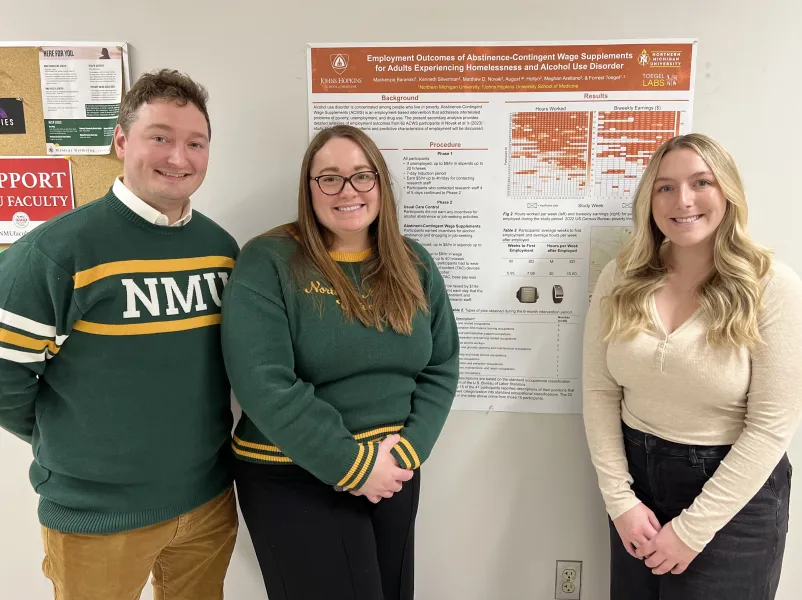Northern Michigan University has assumed oversight of a $2.5 million research grant from the National Institutes of Health (NIH) to evaluate an intervention approach that provides wage supplements—contingent upon documented drug abstinence—as a way to combat drug addiction, promote employment and reduce poverty among people living with opioid use disorder. The project is a collaboration involving NMU's Department of Psychological Science, Johns Hopkins University School of Medicine, and REACH, a substance abuse recovery program in Baltimore, Md.
“The idea behind this intervention is that people work directly with an employment specialist for a little while, and then if they become employed, they are eligible to earn more money beyond their wages provided they abstain from drugs,” said NMU Assistant Professor Forrest Toegel, who had done similar research during his post-doctoral fellowship at Johns Hopkins. “It essentially boosts the incentive for working. A previous study found this approach effective in increasing both abstinence and employment while reducing poverty. We decided to investigate a real-world application of this contingency management intervention by partnering with REACH, an outpatient clinic that serves those with opioid use disorder.”
“These problems are interrelated,” Toegel continued. “People who live in poverty are at an increased risk of having a substance use disorder, not having a job and being homeless. They are also more likely to have obesity, HIV, heart disease and other physical problems. The abstinence-contingent wage supplement program tries to address this cluster of things that are associated with bad health outcomes all at the same time. Rather than just trying to get people off of drugs, we're trying to get people off drugs and also get them employed, which would help to raise them out of poverty. The intervention is temporary—we can't continue to provide the research stipends forever—but hopefully it will be a path to sustained abstinence, employment and beneficial health outcomes.”
His colleague and wife, Assistant Professor Cory Toegel, is completing a paper on a related project that offers incentives for taking HIV medications consistently with the goal of eventually rendering the disease undetectable and non-transmittable.
“These types of interventions revolve around similar principles,” Cory said. “There are a lot of behavioral patterns that people get into because of their environment, and we're trying to change their environment to help nudge them toward healthier behavior. It's really easy for others to say, ‘Well that person is lazy or bad, or they shouldn't be doing that,' but our approach doesn't blame the individual as a person. Instead, it focuses on getting them into an environment that promotes healthy behavior so they can find success.”
Forrest Toegel received approval to bring the $2.5 million grant to Northern when his mentor at Johns Hopkins retired and passed the baton. The funding comes from the National Institute of Drug Abuse of the NIH. Toegel said he understands it to be the largest NIH award Northern has received, and also the university's first-ever R01 grant—the highest level the NIH offers. He added that this research is especially relevant and timely given the anticipated January 2025 rollout of the Medicaid and Healthy Michigan Plan.
Toegel said the REACH substance abuse recovery program in Baltimore collects urine samples from participants on Mondays, Wednesdays and Fridays and sends the results to his Northern Center for Learning and Health lab on campus. His team then determines what types of incentives can be earned, and works with the employment specialists to pay participants via their reloadable credit cards.
NMU graduate student Haillie McDonough and undergraduate research fellow Kay Hintze receive tuition support and stipends through the grant for their involvement in the project.
“I do a lot of the employment specialist work,” said McDonough, who plans to pursue a doctorate. “I talk with the participants directly via phone to try to help them find employment through building resumes, alerting them to job fairs in the Baltimore area, searching for available positions and providing them with helpful resources. I also do a lot of the urine test entries, talk with other staff from REACH and Johns Hopkins, and submit reports to everybody. It's been a big and welcome change to get so much research experience working with the Toegels. That's something I didn't really get during my undergrad program before I came to Northern for my master's.”
On a related note, Forrest Toegel coauthored a publication titled “Cost and cost-effectiveness of abstinence-contingent wage supplements for adults experiencing homelessness and alcohol use disorder,” which will appear in the February 2025 issue of Journal of Substance Use and Addiction Treatment. View the article PDF here.
Media Contact: Forrest Toegel, ftoegel@nmu.edu or 906-227-2919.

